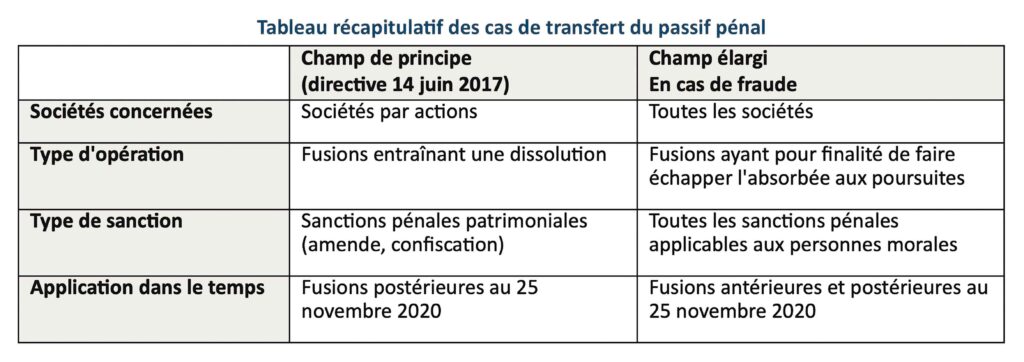An absorbing company can now be criminally liable for acts committed by the absorbed company. For Julien Gasbaoui, lawyer devoting his activity to criminal business law and the defense of accounting professionals, that evolution, due to a reversal of jurisprudence*, will significantly influence the direction of risk audits, since to the civil risk is now added a criminal risk, even committed by a separate legal entity !
had struck a company's archive storage warehouses. This was then the subject of prosecution, because it had failed in its safety obligations. Or, a few months before the hearing before the criminal court, a merger-absorption had taken place. After several trials, the Court of Cassation confirmed, in November 2020*, the criminal conviction of the absorbing company. Why such a development ? French law has recognized the criminal liability of legal entities for more than 20 years.. However, the transmission of criminal liabilities during a merger transaction was until now traditionally rejected. This solution found its justification in the principle of personality of sentences : the legal entity of the absorbed party having disappeared, this disappearance was assimilated to the death of a natural person leading to the extinction of public action. Consequently, the completion of a merger allowed the absorbed company to escape its criminal liability.
The reasons for the evolution
Since 2015, a divergence existed with the Court of Justice of the European Union. Pour the latter, the directive concerned** should be interpreted as leading to “the transmission, to the absorbing company, the obligation to pay a fine imposed by final decision after this merger for violations of labor law committed by the absorbed company before said merger”. French law then found itself in contradiction with EU law and the obligation of each Member State to implement the directives taken by the institutions of the Union.. A first justification for this solution therefore lies in the need to bring French law into conformity with EU law.. On his side, the European Court of Human Rights had opened another breach, considering economic continuity between the absorbed and the absorbing party, implying that the person of the first is not really different from that of the second. Adopting this economic approach, In France, the Court of Cassation in turn considers that “the absorbing company is not distinct from the absorbed company”. Result : the absorbing party may be criminally convicted for acts constituting an offense committed by the second before the merger-absorption operation. The Code of Criminal Procedure, which does not expressly provide for the extinction of public action upon the absorption of a company, does not oppose this new interpretation either. Finally, the idea of a necessity for repression also justifies the solution adopted. As stated by the CJEU, “if the transmission of such liability was excluded, a merger would constitute a means for a company to escape the consequences of the offenses it would have committed, to the detriment of the Member State concerned or other possible interested parties”. Gold for the criminal chamber, the authorization of the transfer of criminal liability between the absorbed company and the absorbing company*** is the only way to financially sanction the absorbing company for acts committed before the merger by the absorbed company.
the latter, the directive concerned** should be interpreted as leading to “the transmission, to the absorbing company, the obligation to pay a fine imposed by final decision after this merger for violations of labor law committed by the absorbed company before said merger”. French law then found itself in contradiction with EU law and the obligation of each Member State to implement the directives taken by the institutions of the Union.. A first justification for this solution therefore lies in the need to bring French law into conformity with EU law.. On his side, the European Court of Human Rights had opened another breach, considering economic continuity between the absorbed and the absorbing party, implying that the person of the first is not really different from that of the second. Adopting this economic approach, In France, the Court of Cassation in turn considers that “the absorbing company is not distinct from the absorbed company”. Result : the absorbing party may be criminally convicted for acts constituting an offense committed by the second before the merger-absorption operation. The Code of Criminal Procedure, which does not expressly provide for the extinction of public action upon the absorption of a company, does not oppose this new interpretation either. Finally, the idea of a necessity for repression also justifies the solution adopted. As stated by the CJEU, “if the transmission of such liability was excluded, a merger would constitute a means for a company to escape the consequences of the offenses it would have committed, to the detriment of the Member State concerned or other possible interested parties”. Gold for the criminal chamber, the authorization of the transfer of criminal liability between the absorbed company and the absorbing company*** is the only way to financially sanction the absorbing company for acts committed before the merger by the absorbed company.
Three limitations to this new responsibility
Only mergers of joint stock companies, which lead to the dissolution of the absorbed company, are concerned. The only penalties incurred are fines and confiscation of property. (patrimonial penalties, based on the principle of universal transmission of assets to the absorbing party). Finally, this reversal of case law is only applicable to merger transactions concluded after November 25, 2020****. So, transactions of this type concluded previously are not affected. By exception, in case of fraud, that is to say when the merger-absorption operation has the aim of avoiding the absorbed party from its criminal liability, the absorbing party is criminally responsible for the acts committed by the absorbing party, and whatever the legal form of the absorbing party, and whatever the date of the merger operation. This exception in the event of fraud does not constitute a reversal of jurisprudence, it is applicable including to merger transactions concluded before the ruling of November 25, 2020.
Consequently, managers and their boards must now review their risk audit analysis grid to take this new situation into account. Ongoing criminal cases within the acquired company must be identified and the related risks carefully calculated to be taken into account in the evaluation of the target company..
* Cass. crim., 25 nov. 2020, n° 18-86.955
** Article 19, § 1er, of Council Directive 78/855/EEC of 9 October 1978 on mergers of public limited companies, codified by Directive 2011/3/EU of the European Parliament and of the Council of April 5, 2011
*** The interpretation of article 121-1 of the Penal Code in the current state of domestic law
**** Date of this judgment, in accordance with the principle of legal predictability arising from Article 7 of the ECHR.













